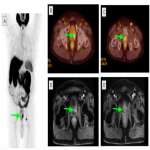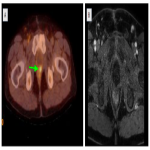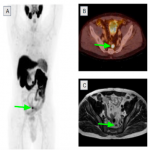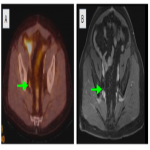Purpose
According to American Cancer Society, 1 man in 9 has the probability of getting diagnosed with prostate cancer (PCa) in their lifetime. 1 out of 41 men dies due to prostate cancer every year [1]. The main radical treatment methods of prostate cancer are surgery and radiation therapy. In patients with clinically intermediate/high risk prostate cancer after initially radical treatment recurrences occur, therefore further treatment requires imaging of precise volume and localization of recurrent disease. Recurrence of prostate cancer can be assessed by magnetic resonance...
Methods and materials
This comparative prospective study included 29 prostate cancer patients with biochemical relapse referred for 18F-PSMA PET/CT, who were previously treated with radical prostatectomy and/or radiation therapy of the prostate bed. The results of MRI and PET/CT were compared using a reference standard that was based on clinical data of patients and/or follow-up information. According to the reference standard all results of examinations were classified as true positive, false positive, true negative or false negative. The diagnostic sensitivity, specificity, accuracy, positive predictive value (PPV) and negative...
Results
29 patients with biochemical prostate cancer recurrence were prospectively enrolled into the study (mean age: 66.83± 6.76 (range 52 – 84) years). Mean PSA value at the time of the studies were 2.48 ng/ml, median Gleason score was 7 (range 5-9), PSA median doubling time 3.9 months.
The evaluation of local recurrence was based on results of PET/CT and MRI. In our study this included a pathologic 18F-PSMA-1007 uptake in the prostate or prostate bed as reported in 10/29 patients (35 %). In MRI prostate...
Conclusion
This study results revealed 18F-PSMA-1007 PET/CT as superior diagnostic tool to MRI for evaluation of prostate cancer local recurrence and lymph node metastases. Both methods detect recurrence with high accuracy, but 18F-PSMA-1007 PET/CT showed better detection of recurrence in small size lymph nodes with non-specific characteristics on MRI.
Personal information and conflict of interest
L. Saule:
Nothing to disclose
M. Radzina:
Nothing to disclose
M. Tirane:
Nothing to disclose
L. Roznere:
Nothing to disclose
L. Friebe:
Nothing to disclose
M. Kalnina:
Nothing to disclose
V. Lietuvietis:
Nothing to disclose
A. Freimanis:
Nothing to disclose
E. Vjaters:
Nothing to disclose
References
American Cancer Society. Prostate Cancer Information and Overview. https://www.cancer.org/cancer/prostate-cancer.html
Radzina, M., Tirane, M., Roznere, L., Zemniece, L., Dronka, L., Kalnina, M., Mamis, E., Biederer, J., Lietuvietis, V., Freimanis, A., & Vjaters, E. (2020). Accuracy of 68Ga-PSMA-11 PET/CT and multiparametric MRI for the detection of local tumor and lymph node metastases in early biochemical recurrence of prostate cancer. Am J Nucl Med Mol Imaging. 2020;10(2):106-118. Published 2020 Apr 15.
Paddubny K, Freitag MT, Kratochwil C, Koerber S, Radtke JP, Sakovich R., Kopka K, Giesel FL, 18F-PSMA-1007...





